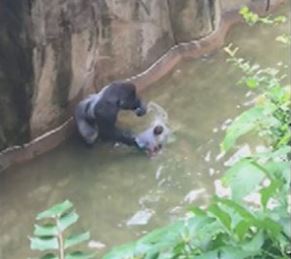 Last week, amidst all the outcry against zoos and irresponsible parents after an endangered gorilla was killed, I posted about the similarities between that situation and the gospel: “the innocent dying that the guilty might be made innocent.”
Last week, amidst all the outcry against zoos and irresponsible parents after an endangered gorilla was killed, I posted about the similarities between that situation and the gospel: “the innocent dying that the guilty might be made innocent.”
Yesterday, the world awoke to news of a different kind…and a different response: 49 people (not a gorilla) gunned down by Omar S Mateen (not a zookeeper) in a gay nightclub (not a zoo) in Orlando, Florida. Here was no sacrifice of one innocent to save many guilty; Mateen’s death—the 50th of the tragic day—was as inevitable as it was willing.
I confess that my own response troubles me more than any other. I read no news stories, watched no coverage of the event. Perhaps I’ve seen too many such headlines and have become callous to terror. Perhaps I’m weary of the arguments for and against guns that I know will result. I’m certainly leery of the political posturing that will take place—and already has—about Muslims in America. And I’m especially wary of the responses we’ll hear from those who claim to follow Jesus but will speak only of judgment on the victims.
But my ostrich-like silence could last only until this morning, when an email appeared with this challenging headline: “Orlando Shooting: Why Christians Must Not Stay Quiet.” Indeed, it was that headline and the article that followed that motivated this post. But what words could I possibly add that would be more than mere noise?
Perhaps the place to begin is to offer a confession on behalf of the Christian body of which I have been a part for nearly half a century. As would-be followers of Christ, we—and I—have shown far more condemnation than grace toward homosexuals. We have complained about “agendas” and “lifestyles” but have not invited conversation. We have judged and called for judgment but have not shown grace. We have argued for doctrine and against science (which need not be mutually exclusive, by the way). And I am sorry. We—I—have been wrong, have lived and loved so unChristlike. All of this is changing, at least in some circles, but not enough, and not quickly enough. (Note: I am not calling for a change of theology, but action.)
A shift in our thinking on guns is also needed. This is hard for me, perhaps the hardest point of conflict between my Christian faith and my American citizenship. I don’t own a gun, though I want to—ostensibly for protection, though I’ve never been in a situation where I’ve needed that level of protection, nor can I truly imagine a situation where I would need to protect myself or my family with a firearm. But I don’t want to give up my rights as a citizen even though I pray to a Savior who gave up not just his rights, but his life, for me. Friends have posted things like “it’s not about guns, it’s about our godless society.” That may be true at one level, but can I really share the gospel with a gun on my hip? Jim Elliot—whose life and death brought the Aucas to faith in Christ—already answered that question:
Jim Elliot reached for the gun in his pocket. He had to decide instantly if he should use it. But he knew he couldn’t. Each of the missionaries had promised they would not kill an Auca who did not know Jesus to save himself from being killed. (See a short biography here.)
Something needs to change, and I need to begin with me. Most of all, I need to live, speak, and share the gospel I say I believe. I am most comfortable around people like me—Christians. But comfort never sold anyone on Jesus. I need to get uncomfortable, to get around gays and Muslims and anyone who doesn’t know Jesus, then live in such a way that when the see me, they will see Him and want to know Him.
Man, that’s not going to be easy. Maybe you can help.

 The news made headlines around the world, sparking outrage and protests: a 17-year-old gorilla at the Cincinnati Zoo was killed in order to save the life of a 3-year-old boy who had slipped into the animal’s exhibit. The story has all the elements of a literary tragedy, from the happy beginning to a disastrous ending, with a series of misfortunes leading from one to the other.
The news made headlines around the world, sparking outrage and protests: a 17-year-old gorilla at the Cincinnati Zoo was killed in order to save the life of a 3-year-old boy who had slipped into the animal’s exhibit. The story has all the elements of a literary tragedy, from the happy beginning to a disastrous ending, with a series of misfortunes leading from one to the other.